Has Julius Malema's EFF become one-issue party in South Africa?
- Published
- comments
Punches were thrown as the MPs were forcibly ejected - the BBC's Andrew Harding filmed the scene on his mobile phone - apologies for the sound quality
Following the chaos in parliament, the Economic Freedom Fighters (EFF) and their leader Julius Malema have succeeded in sending a clear message to President Jacob Zuma that they want him to pay back the money for the controversial taxpayer-funding renovations to his private home in Nkandla.
But has the time not come for the party of red overalls and berets to focus on the substantive issues affecting their rank-and-file members?
Huge matters such as education, health, inequality, jobs and other issues of national importance needing urgent attention seem to have been put on the back burner.
The EFF, a break-away faction from the governing African National Congress' (ANC) youth wing, has been harping on the Nkandla saga for the last year.
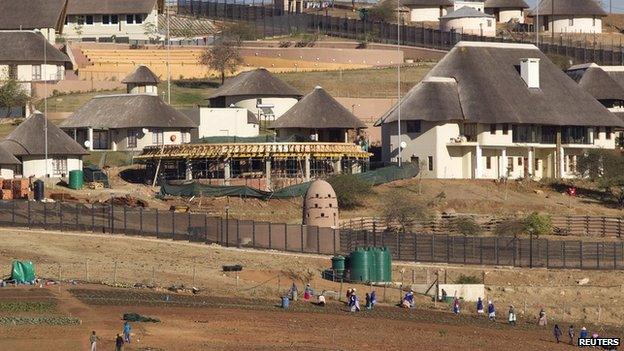
The Nkandla homestead pictured in 2012
They campaigned on it. They demanded that President Zuma must pay back the money for unduly benefiting from security upgrades which cost the taxpayer an astronomical figure of $23m (£13m).
Even by South Africa's standards of opulence, usually reserved for the most expensive properties on the Atlantic seaboard in Cape Town, this was still ostentatious.
The homestead has a swimming pool, chicken run, clinic and a hall that doubles as a cinema.
All these items were listed in the findings of a scathing report by the Public Protector Thuli Madonsela.
She asked the president to refund the money to the state for those items which had nothing to do with security.
President Zuma is challenging these findings in the courts. He is adamant that he never asked for the refurbishments.
One-issue party?
So, it is understandable when a party - which claims to represent the poorest of the poor - can be so furious.
However, there are many people who said the scuffles seen inside the chamber on Thursday were too much - they embarrassed the nation.
There are many voices, some coming from circles within Mr Malema's kitchen cabinet, which are beginning to question whether the EFF has become a one-issue party.

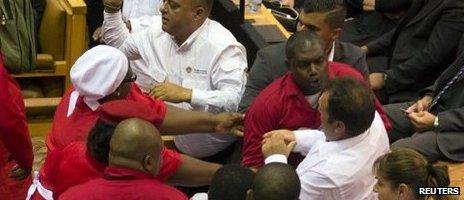
The EFF MPs brawled with white-shirted security officers
Media analysis by BBC Monitoring
South African newspapers are appalled by the events. "House of Shambles" reads the front-page headline of tabloid Sowetan, external, while Daily Maverick runs the headline "SONA: Shame of the Nation 2015, external".
"The day started sunny, but it ended with rain: a fitting metaphor for the course of events", the latter remarks.
But in the view of Times Live, external: "For a solid hour last night South Africa resembled a messy, dysfunctional state being held together by the security forces". It believes much of the blame "must be shouldered by the EFF... But the truth is that Zuma... is a deeply polarising figure".
Under the headline "Sona disintegrates into chaos", City Press, external notes "the state of the nation address lived up to the hype and delivered more drama and chaos than was expected".
And IOL, external feels "the scenes in Parliament were farcical, beginning with the institution's transparent attempts to muzzle both the media and MPs by jamming the mobile signal in the chamber".
But Business Day, external fears for the future. "Something is deeply wrong if a country that claims to be democratic experiences this kind of paralysis while its citizens get used to a culture of thuggery at the highest levels", it opines.

More than one million people voted for the EFF in last year's general elections. This gave the EFF 25 seats within the 400-member legislature.
Andile Mngxitama, once hailed as a possible successor to Mr Malema said: "We find it unethical, we find it reactionary and we find it part of the culture of corruption and part of abusing legitimate issues of the people for narrow ends."
Mr Mngxitama was attacked by a faction of Malema supporters.
Musi Maimane, the leader of the official opposition in the house of assembly and a vocal critic of President Zuma, disagreed with the EFF's approach.
Before the chaos in parliament he had said: "This is not the state of Nkandla address. This is the state of the nation address. The nation is in a difficult space at the moment. We want to deal with more substantive issues now."
But he also led his Democratic Alliance (DA) caucus out of parliament in protest. He said it was unconstitutional for the speaker to call the police into the chamber.
Change of gear
The majority of Mr Malema's support base are black underprivileged people, largely deprived by the legacy of apartheid.
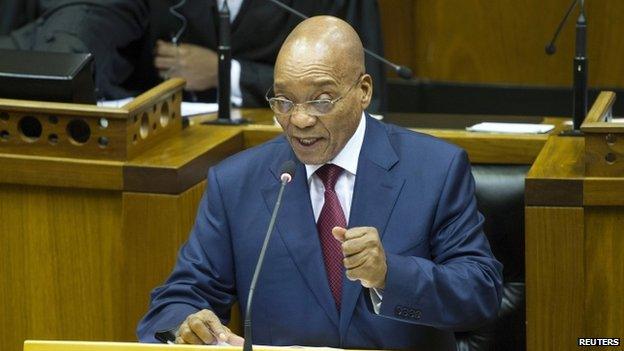
President Zuma's state of the nation speech was interrupted by the scuffles
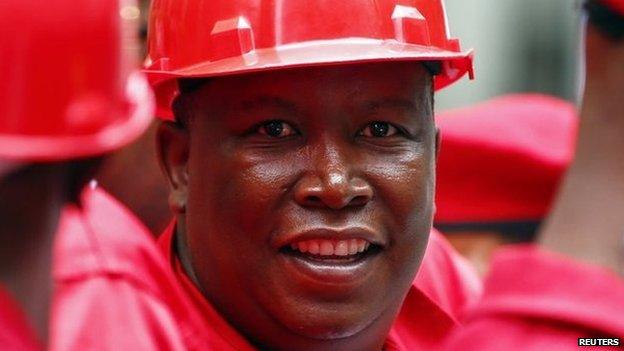
Julius Malema and his colleagues wear red workers' clothes in parliament
Uppermost in their minds is the energy crisis gripping the country's power grid.
They're equally concerned about the corruption allegations engulfing President Zuma and his Nkandla residence woes - but more importantly they want to improve their own quality of life.
Even if Mr Zuma "pays back the money" it will not make any difference to their desperately poor lives.
Those who voted for Mr Malema must be wondering whether their issues will be raised in parliament as their MPs dig in on one issue.
This year's budget for the state of the nation was slashed from $400,000 under the theme "Moving South Africa Forward".
The EFF said it wanted to "rescue" parliament from being a "fashion parade" - and they did.
The problem is they never raised issues such as land redistribution, which they campaigned about and listed on their election manifesto.
Land ownership in South Africa is still very much skewed along racial lines. Large chunks of land are still in the hands of whites, while the majority black population remains largely landless.
So EFF supporters will be hoping for a change of gear as the nation's fifth parliament picks up where it left off.
Hoping that their elected representatives will focus on the key issues affecting them in the dusty townships dotted across South Africa and not just one man's bloated house.
- Published24 January 2015
- Published8 May 2024
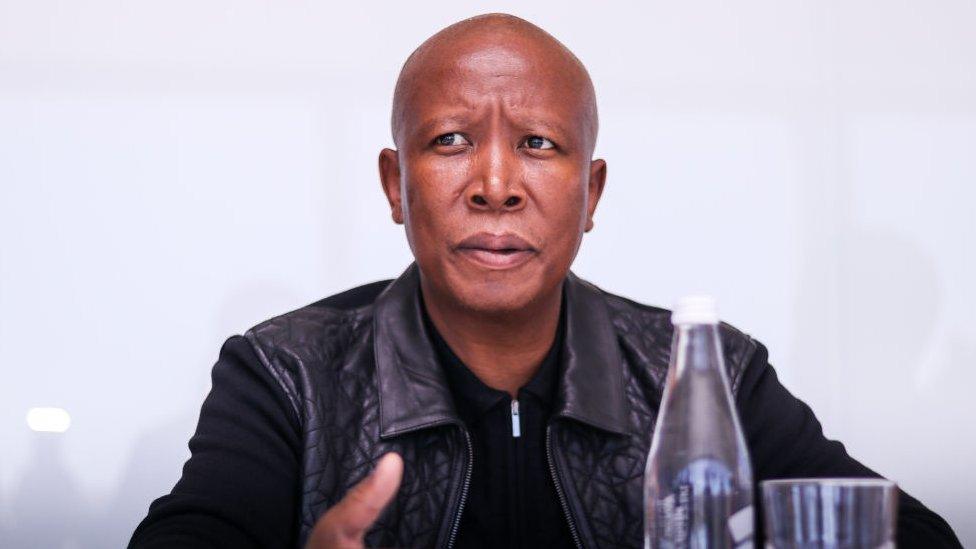
- Published21 September 2012
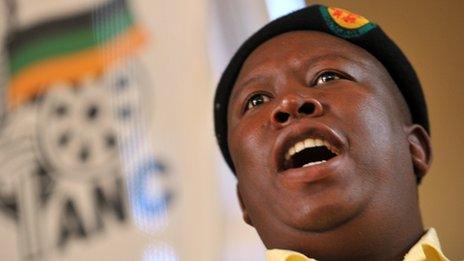
- Published13 September 2012